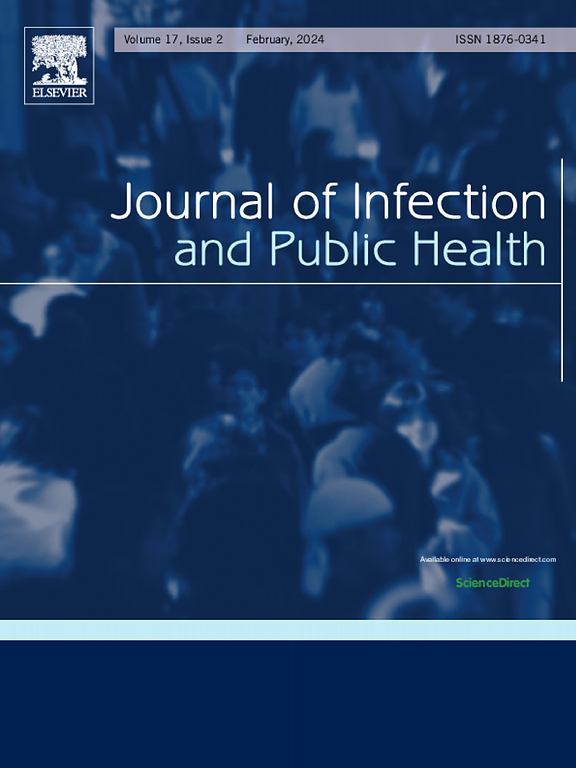The impact of recent Covid-19 infection on cytomegalovirus antibodies
IF 4
3区 医学
Q1 INFECTIOUS DISEASES
引用次数: 0
Abstract
Background
The COVID-19 pandemic has led to an unexpected rise in patients with increased CMV-IgM antibody titers at our hospital in China, without concurrent evidence of CMV-related organ pathology, prompting an investigation into the relationship between CMV-IgM and COVID-19.
Methods
We retrospectively analyzed 516 patients tested for CMV-IgG or IgM between January 15 and February 3, 2023. We used Mann-Whitney U and chi-square tests to compare COV2-IgG/IgM profiles between CMV-IgM positive and negative groups. Logistic regression assessed risk factors for increased CMV IgM positivity, adjusting for age, gender, CRP, and CMV IgG. CMV DNA was detected by real-time PCR (detection limit >500 copies/mL), and CMV-IgG/IgM and COV2-IgG/IgM titers were measured by ELISA. Variance analysis compared CRP levels across groups.
Results
A notable rise in CMV IgM positivity was observed following the COVID-19 outbreak. The group of patients testing positive for CMV IgM exhibited significantly higher titers of COV2 IgM (0.83 vs 0.49, P < 0.001) and a higher rate of COV2 IgG positivity (93.8 % vs 85.4 %, P = 0.02). Logistic regression analysis demonstrated a significant association between the COV2-IgG and an increased likelihood of CMV IgM positivity (OR=3.050, 95 % CI=1.208–7.700, P = 0.018). A linear correlation was identified between CMV IgM and COV2 IgM titers. CMV IgM levels did not differ based on CMV DNA status, and no association was observed between CRP values and CMV IgM positivity. These findings suggest that the increase in CMV IgM is likely attributable to COVID-19 rather than an active CMV infection.
Conclusions
Our research indicates that increased CMV IgM levels may correlate with COVID-19, possibly due to antibody cross-reactivity. Caution is advised when interpreting CMV IgM results amidst the pandemic. Using CRP as a supplementary marker may aid in identifying active infections. It's crucial to consider COVID-19's impact on CMV IgM levels in clinical assessments.
近期新冠病毒感染对巨细胞病毒抗体的影响
COVID-19大流行导致中国医院CMV-IgM抗体滴度升高的患者意外增加,没有cmv相关器官病理的同时证据,促使对CMV-IgM与COVID-19之间关系的研究。方法回顾性分析2023年1月15日至2月3日期间516例CMV-IgG或IgM检测患者。采用Mann-Whitney U检验和卡方检验比较CMV-IgM阳性组和阴性组的COV2-IgG/IgM谱。Logistic回归评估CMV IgM阳性增加的危险因素,调整年龄、性别、CRP和CMV IgG。实时荧光定量PCR检测CMV DNA(检测限500拷贝/mL), ELISA检测CMV- igg /IgM和COV2-IgG/IgM滴度。方差分析比较各组CRP水平。结果2019冠状病毒病暴发后,CMV IgM阳性明显升高。CMV IgM检测阳性的患者组COV2 IgM滴度明显较高(0.83 vs 0.49, P <; 0.001),COV2 IgG阳性率较高(93.8 % vs 85.4 %,P = 0.02)。Logistic回归分析显示,COV2-IgG与CMV IgM阳性可能性增加之间存在显著相关性(OR=3.050, 95 % CI= 1.208-7.700, P = 0.018)。CMV IgM和COV2 IgM滴度呈线性相关。CMV IgM水平没有因CMV DNA状态而不同,CRP值与CMV IgM阳性之间没有关联。这些发现表明,CMV IgM的增加可能归因于COVID-19,而不是活动性CMV感染。结论sour研究提示CMV IgM水平升高可能与COVID-19相关,可能与抗体交叉反应有关。在大流行期间解释巨细胞病毒IgM结果时,建议谨慎。使用CRP作为补充标志物可能有助于识别活动性感染。在临床评估中考虑COVID-19对CMV IgM水平的影响至关重要。
本文章由计算机程序翻译,如有差异,请以英文原文为准。
求助全文
约1分钟内获得全文
求助全文
来源期刊

Journal of Infection and Public Health
PUBLIC, ENVIRONMENTAL & OCCUPATIONAL HEALTH -INFECTIOUS DISEASES
CiteScore
13.10
自引率
1.50%
发文量
203
审稿时长
96 days
期刊介绍:
The Journal of Infection and Public Health, first official journal of the Saudi Arabian Ministry of National Guard Health Affairs, King Saud Bin Abdulaziz University for Health Sciences and the Saudi Association for Public Health, aims to be the foremost scientific, peer-reviewed journal encompassing infection prevention and control, microbiology, infectious diseases, public health and the application of healthcare epidemiology to the evaluation of health outcomes. The point of view of the journal is that infection and public health are closely intertwined and that advances in one area will have positive consequences on the other.
The journal will be useful to all health professionals who are partners in the management of patients with communicable diseases, keeping them up to date. The journal is proud to have an international and diverse editorial board that will assist and facilitate the publication of articles that reflect a global view on infection control and public health, as well as emphasizing our focus on supporting the needs of public health practitioners.
It is our aim to improve healthcare by reducing risk of infection and related adverse outcomes by critical review, selection, and dissemination of new and relevant information in the field of infection control, public health and infectious diseases in all healthcare settings and the community.
 求助内容:
求助内容: 应助结果提醒方式:
应助结果提醒方式:


